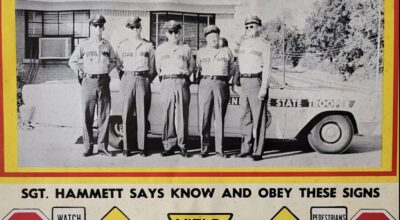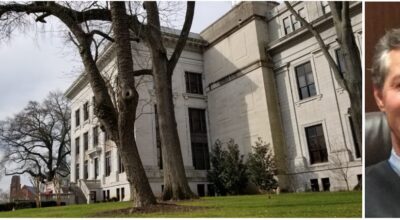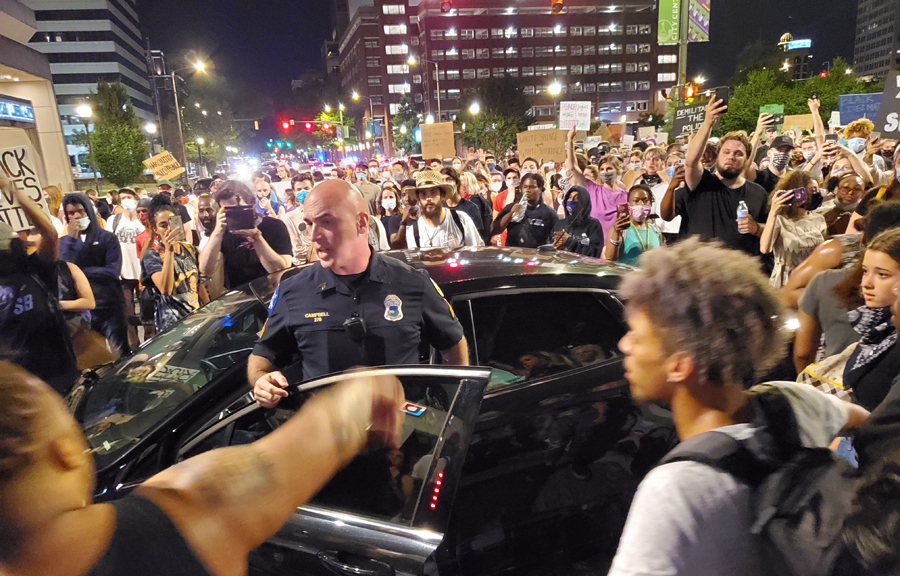
Chattanooga police officer Steve Campbell trades good wishes with dozens of passersby as a column of 600 protesters passes by the public library in Chattanooga during the George Floyd protests against police abuse. (Photo David Tulis)
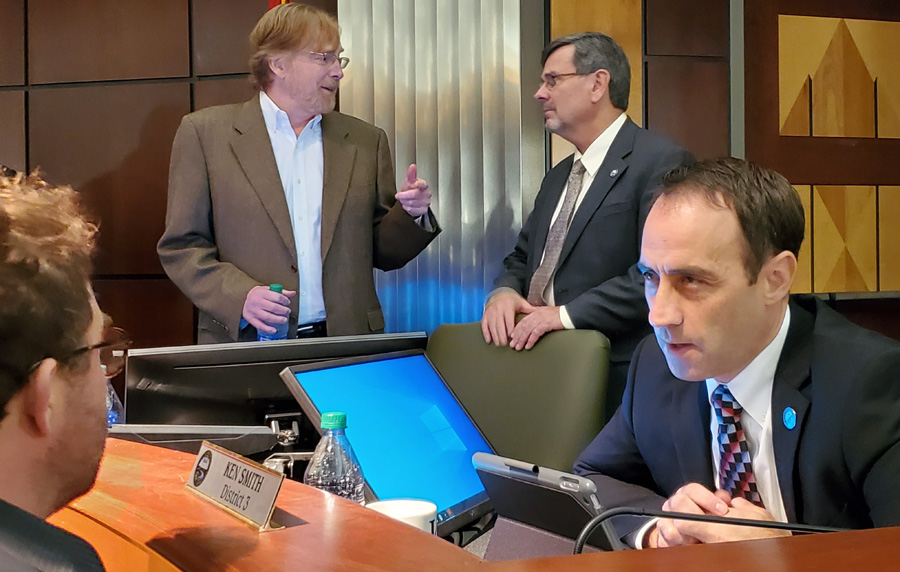
Ken Smith, right, city council member, talks with a constituent as members Jerry Mitchell, left, and Chip Henderson chat after a Chattanooga city council meeting. The city has been under transportation administrative notice since 2018 and corruptly makes no reforms to policing practice. (File photo David Tulis)
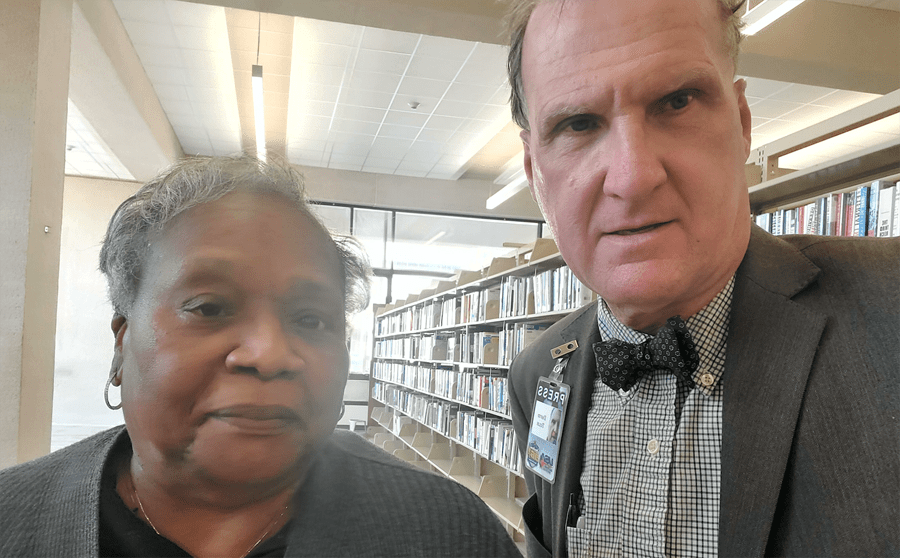
Rev. Annie Pierre of the NAACP talks with David Tulis and says she will review his notice intending to halt traffic stops that are outside the scope of the law across Hamilton County. She has repeatedly expressed strong support for this project. (Photo David Tulis)
CHATTANOOGA, Tenn., Saturday, Aug. 16, 2025 — A firm believer in administrative notice, my lawsuit to decriminalize traffic stops, as they are called, contains important facts ignored by U.S. district court judge Travis McDonough. Notice lets officials know what the law is and helps them perform their duties. I put Hamilton County and the sheriff’s office in Chattanooga on administrative notice twice.
One notice was for the requirement for arrest warrant for a misdemeanor offense that is not a breach of the peace. If cops and deputies obey the laws described therein, we would enjoy an80 percent reduction of arrests.
A second notice is on the disabilities and authorities in the state traffic law. This body of law is in title 55, motor and other vehicles, and title 65, chapter 15, carriers. The existence of agencies and administrative law in no away derogate or abrogate common law rights such as ingress-egress, communication, private travel and free exercise of rights on the public right of way.
My lawsuit counted on these two notices having been read by county authorities and the sheriff, Jim Hammond at the time. I relied on nonresponse as agreement and acquiscence. Tennessee transportation administrative was delivered personally to former sheriff Hammond in March 2018. The other, on arrest authority, served on the county April 15, 2020. These notices, I allege, broaden the “totality of circumstances” the court must consider to determine if deputy Brandon Bennett’s arrest of me Nov. 22, 2023, was reasonable.
Because he knew actually or constructively (putatively) about llimits in title 55 and 65, chapter 15, he arrested me knowingly and intentionally to oppres me under color of law, I allege in the case. What follows is a brief treatment on notice as part of my petition to the court of appeals for reversal.

Placards on the skyline say city government has done too little to protect the people from Mayor Andy Berke’s police. Former Mayor Andy Berke ignored an administrative notice indicating traffic stops, hated by blacks, are outside the scope of the statute, and so has Mayor Tim Kelly. (Photo David Tulis)
****
Notice in reasonableness, totality of circumstances analysis
Court pretermission of material facts regarding defendant state of mind in “totality of circumstances” analysis following notice is prejudicial.
“To determine whether an officer had probable cause to arrest an individual, we examine the events leading up to the arrest, and then decide ‘whether these historical facts, viewed from the standpoint of an objectively reasonable police officer, amount to’ probable cause.” Maryland v. Pringle, 540 U.S. 366, 371, 124 S. Ct. 795, 800, 157 L. Ed. 2d 769 (2003).
Appellant served the following notices on defendants:
- March 1, 2018: Administrative notice to Sheriff Jim Hammond on the limits of state police power under Title 55 and 65.
- April 15, 2020: Notice to Hamilton County Commission detailing the “public offense” standard for warrantless arrests under T.C.A. § 40-7-103.
- Nov. 22, 2023 (during arrest): On-scene oral notice to Mr. Bennett rebutting any presumption of privilege-taxable activity and demanding legal basis for enforcement action.
Appellant administrative notices in Exhibit Nos. 1 and 2 enlarge the totality of circumstances the court be required to examine, making defendants aware of the nature of their misuse of criminal police authority in administering privilege taxable activity by one they presume to be in a motor vehicle.
Tennessee Transportation Administrative Notice
“The familiar aphorism teaches that where there is smoke there is fire; but smoke, or something tantamount to it, is necessary to put a person on inquiry notice that a fire has started.” Design Basics, LLC v. Chelsea Lumber Co., 977 F. Supp. 2d 714, 724 (E.D. Mich. 2013). As the Tennessee Supreme Court held, “it was unnecessary for the [plaintiff] to have been aware that there had been a breach of the appropriate legal standard in order to be deemed to have discovered [her] right of action.” Id. at 533. Rather, she “needed only to be aware of facts sufficient to put [her] on notice that an injury had been sustained as a result of [the attorney’s] advice” Id. Humphreys v. Argabrite, 162 F. App’x 544, 547 (6th Cir. 2006). Details on doctrines of notice are Doc. 28, PageID # 28.
Without stating grounds, the court refuses to account for the case’s totality of fact circumstances – starting with administrative notice and acquiescence. These facts require the court to admit defendants knew, either actually or putatively, that driving a motor vehicle is privilege taxable activity handled administratively under commercial regulation police power.
Complaint says appellant served “Tennessee transportation administrative notice” upon defendants March 1, 2018, to assist them in lawful public service. The arrest is without probable cause because the deputy knew – or was obligated by law and notice to be on awares – that a damaged taillight on the back of appellant’s car under privilege is not a crime, and requires action by DOSHS, that HCSO is not co-administrator with DOSHS of the title 55 regulations and is not statutorily empowered to enforce transportation regulation as if every breach were a crime. EXHIBIT No. 2 (Doc. 1 PageID #26).
It’s not amenable criminally in instant case because, as the dialogue streetside shows, Mr. Bennett tosses aside his casus belli in making the arrest. That is, of commerce and purported criminal enforcement of privilege law. He invokes title 55 as his authority, binding his person and his acts to that law.
He states three times that appellant is not involved in privilege taxable activity under title 55. “The administrative notice outlines the nature of transportation regulation and spotlights the line separating regulatory authority over one sector of the traveling public from that other sector of the traveling public upon which no authority is exercisable except for cause or under criminal warrant” (Doc. 1 PageID # 23). That would have been his administrative enforcement authority, if he had it to begin with.
Privilege central to complaint
ISSUE — Economic regulation arises from lawfully constituted authority under the state and federal constitutions codified by statute, and appeal to such regulation is reasonable when allegation of wrongdoing is made in terms of that regulation.
Privilege is the basis of the rights the complaint defends. This cause represents the truism “driving a motor vehicle is a privilege.” A damaged taillight is a misdemeanor, as defendants criminal filings alleged, but before it’s a criminal offense appellant has right to a hearing according to the law — prejudicially denied by the court. T.C.A. § 55-10-201.
Privilege is controlling law in Tennessee, its administrative regime by state commissioners used in the other 49 states. Privilege is one of two tax powers granted the state in Tenn. Const. Art. 2 sect. 28. Privilege is an economic activity, for profit, that affects the public interest. Id. Phillips v. Lewis (Doc. 1 PageID# 39).
Privilege taxable activity has long been described in its largest scale use
The business of using the public highways for profit, earned by transporting persons and property for hire, has been definitely excluded from the category of private or personal rights arising from citizenship. Recent decisions of the Supreme Court of the United States have determined certain fundamental principles concerning the use of the highways. One is “that the primary use of the state highways is the use for private purposes; that no person is entitled to use the highways for gain as a matter of common right.” Hoover Motor Express Co. v. Fort, 167 Tenn. 628, 72 S.W. (2d) 1052, 1055. The statement and definition of the terms and conditions upon which a privilege, not a matter of common right, may be exercised is, we think, within the declared purpose of regulation and does not amount to prohibition. In such a case the prevention of an unauthorized exercise of the privilege is clearly implied in the statement of the purpose to regulate it.
The statute under consideration is a comprehensive regulation *** to protect the safety of the traveling public, and to protect the property of the state in the highways from unreasonable, improper, or excessive use.
State v. Harris, 168 Tenn. 159, 76 S.W.2d 324, 325 (1934)
Complaint makes clear assertion of this right. “Defendants *** abrogate the uniform administrative procedures act *** which law regulates accusations and controversies arising from the for-hire or commercial use of the public roadways, which body of law is civil in operation, and not criminal, defendants pre-empting operation of that law in exercise of police powers and physical violence ultra vires” (Doc. 1, PageID # 3,¶7). The taillight damage is under title 55, and “[A]ll actions by state of Tennessee subject to UAPA at T.C.A. § Title 4-5-101 et seq, and subject to accused’s right in defense to force state claim movants to exhaust their administrative remedies prior to seeking redress in criminal court” (Doc.1, PageID # 12,¶ 38). Appellant reports, Doc. 1, PageID # 15, his criminal proceedings, “Accused insists on his right that movant state exhaust its administrative remedies,” with its refusal to do so termed official oppression and “arbitrary and capricious policy” because the parties acted “intentionally or knowingly” in misconduct (Doc. 1, Page ID# 20). APPENDIX EX. No. 2
Driving or operating a motor vehicle is an occupational privilege, no different than plumbing, running a scrap metal yard or embalming the dead. Driving a motor vehicle is a privilege universally obtained and enjoyed in Tennessee, it being the most popular and coveted occupational privilege foundational to exercise of many other privileges and of most all rights. Everyone, virtually every adult, applies for the privilege by application and payment of fees, all under federal auspices.
Privilege penalty provisions
ISSUE — If a damaged taillight is a misdemeanor, and failure to exhibit license on demand of a highway patrol officer is a misdemeanor, court ignores facts of notice, enlargement of sphere of “totality of circumstances.
“Bennett told Plaintiff that he was in violation of a traffic law and, therefore, he was requesting plaintiff’s license,” the court recounts. “Plaintiff responded, ‘do you believe that I’m operating in commerce right now[,] sir? *** Bennett told Plaintiff, ‘I’m not going to get into all that with you. You’re driving a motor vehicle on a state roadway, so I am going to ask for your license” (Doc. 37, PageID ## 329, 330).
The deputy’s purported factual observations (“driving a motor vehicle”) are conclusory statements constituting allegation of “violation of a traffic law.” But he says he is “not *** going to get into all that with you.” Mr. Bennett is unwilling to cite his authority under title 55, if any, or begin an investigation into whether his victim has contracts, bills or invoice that would constitute written evidence of commerce. He’s unwilling to explain grounds for exercise criminal authority.
The state is jealous of the motor vehicle privilege. Prosecution of a breach under privilege taxable activity under commissioner of safety at T.C.A. § 4-3-2005 is called a contested case regarding driver license, registration or use of the road. “The commissioner of safety, in the commissioner’s discretion, is hereby authorized to appoint or designate hearing officers to conduct contested case hearings under the Uniform Administrative Procedures Act, compiled in chapter 5 of this title.” T.C.A.§ 4-3-2005. Hearing offices — review of initial orders. Further, “The licensing as a privilege of the driving of any motor driven vehicle upon the roads, streets or other highways of the state is declared an exclusive state privilege and no tax for such privilege under any guise or shape shall hereafter be assessed, levied or collected by any municipality of the state” T.C.A. § 6-55-501.
Complaint sufficiently brings facts and legal argument to show that appellant has right to a trial by jury as to damages he suffered being falsely arrested and imprisoned while on protectible press business recognized in Tenn. Const. art 1 § 19 and U.S. Const. Amend. 1. Defendants knew under notice he was on the road apart from privilege regulation. They knew under notice he had no mens rea to commit a crime involving a taillight. Notice showed him to believe that a damaged property such as missing plastic on a taillight is not a crime, but potentially actionable by DOSHS under UAPA.
Notice shows appellant lacked scienter for any criminal act upon which defendants based “probable cause” or “reasonableness” in arresting him under criminal authority recognized as theirs in T.C.A. § 8-8-213, the sheriff’s duties law. They knew under notice that if they were going to arrest him for a misdemeanor crime, the deputy had to have an arrest warrant in hand or evidence he had committed a crime or was about to commit a crime. They knew driving a motor vehicle is a privilege the terms of which are enforceable under UAPA.
The fighting and mercy reporter at GiveSendGo
David runs a personal nonprofit fighting and mercy ministry. He thanks you for checks sent directly to c/o 10520 Brickhill Lane, Soddy-Daisy, TN 37379. Also at GiveSendGo.

I am reporter with Eagle Radio Network — marvelously playing rock hits in Chattanooga, and online at https://www.eagleradionetwork.com/
